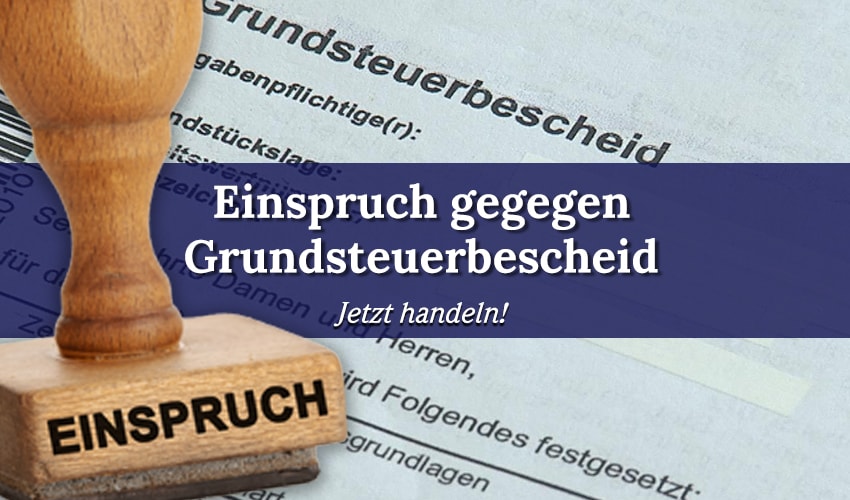
Appeal against property tax assessment - How you should act!
The property tax reform has cost many homeowners and landowners time and nerves. This is probably one of the reasons why many owners were reluctant to tackle the extensive task: just a few days before the deadline on January 31, only 65 percent had submitted their property tax return. Only Bavaria granted property owners an extension of the deadline until April 30, but this has now also expired.
If you have not yet submitted a property tax return for your land and property, you should definitely take action: Lower Saxony recently became the first federal state to announce that a penalty of 25 euros per month will be imposed if property tax returns have not yet been submitted.
However, if you have already prepared and sent off your declaration, your work is not over yet. You will receive a total of three property tax assessment notices from the federal states, which you should definitely check. Because it may be worth appealing against the notices!
Here you can find out what you need to know, what deadlines you need to observe and whether an objection is actually worthwhile.
Table of contents:
- Appeals against property tax assessments: What deadlines must be observed?
- What must be included in the letter of objection?
- Is an appeal against the notices generally sensible?
- What consequences can the new property tax have for owners?
- Will there be model lawsuits?
- In which countries is the so-called federal model applied?
- Why do lawyers consider the property tax reform to be unconstitutional?
- How many appeals against the new property tax assessments have already been received?
- What notices do owners receive?
- Checking the notifications: Where may errors have occurred?
Do you need help with your property tax return or an objection to the assessment? Our tax advisors will help you quickly and easily!
Rudolf-Diesel-Str. 5, 65760 Eschborn near Frankfurt
1. appeals against property tax assessments: what deadlines must be observed?
In general, you have one month to appeal against your property tax assessment notices. The period begins three days after the date on your notice. If this happens to fall on a Sunday or public holiday, the deadline begins on the following working day. You then have exactly one month from this date, for example from June 15 to July 15, until your objection must be received by the relevant tax office.
2. what must be included in the letter of objection?
An informal letter to the relevant tax office is sufficient to appeal against your assessment. The letter should include your name, address, reference number and tax number. Ideally, the reason for the objection can already be described after the assessment notice has been checked. You can find out more about this in the article below.
However, it is also possible to lodge an objection without stating the exact reason, for example if it has not yet been possible to check the details in detail. You can enclose a letter stating that the reasons will be submitted soon. The tax officials will then send a letter to your address asking you to justify your objection. Once again, you will be given a time limit. This will at least give you time to check the data requested in detail.
3. is an appeal against the notices generally sensible?
Numerous recommendations can be read on the Internet and in daily newspapers these days to lodge an appeal "in any case" and at least "as a precaution", as many properties have been valued far too high. The taxpayers' association advises people to appeal, as do well-known lawyers.
It is clear that the chances of success of appeals and lawsuits are very vague at the present time. However, in the case of obvious errors, an appeal should clearly be lodged. The same applies if you consider the parameters used to be unlawful. The Verband Haus und Grund and the Steuerzahlerbund recommend that property owners lodge an objection in any case, as they have doubts about the constitutionality of the property tax reform.
4 What consequences can the new property tax have for owners?
In the worst case scenario, owners can expect massive additional costs as a result of the new property tax from January 2025. However, your property tax assessment notice or property tax assessment notice will not tell you exactly how high these costs will be. Your municipality will only set the respective assessment rates in the coming year. The calculation of these will then result in the amount of property tax for property and land owners in the so-called property tax assessment notice.
5. will there be model lawsuits?
Model lawsuits are already pending in Baden-Württemberg. There, the taxpayers' association and several associations have filed two lawsuits together with property owners against an assessment of the property tax value. The aim is to clarify questions regarding the constitutionality of the new state property tax law and inaccuracies in the standard land value. The background to this is that in the south-western federal state, the type of property on plots of land of the same size does not play a role in determining the aforementioned property tax value. Therefore, the same property tax value is assumed for a villa or an apartment building. Citizens in Baden-Württemberg can join these model lawsuits if the decision is to be challenged on the grounds that the state property tax law is unconstitutional.
Further model lawsuits in other federal states are already being planned for the future, as lawyers are also critical of the federal model applied in a total of eleven federal states. In his study commissioned by the Association of German Taxpayers and the Property Owners' Association Haus und Grund, constitutional lawyer Gregor Kirchhof came to the conclusion that the federal model is unconstitutional. These associations are already preparing model lawsuits in Berlin, Mecklenburg-Western Pomerania, North Rhine-Westphalia, Rhineland-Palatinate and Saxony.
6 In which countries is the so-called federal model applied?
The so-called federal model is applied in all eleven federal states except Bavaria, Lower Saxony, Baden-Württemberg, Hesse and Hamburg. In Saxony and Saarland, the federal model applies with slight deviations. These states apply their own standards for property tax.
7 Why do lawyers consider the property tax reform to be unconstitutional?
The constitutional law expert Gregor Kirchhof justified his assessment that the federal model of the property tax reform is not constitutional on the basis of several points:
- Standard land values are not comparable,
- Violation of the Basic Law by flat rates such as the net cold rent,
- Failure to take individual circumstances into account,
- The amount of the tax burden is not yet known.
However, this assessment and the model lawsuits currently being prepared by associations such as Haus und Grund do not automatically mean that an appeal will be successful. So far, it is likely that the new property tax will become due from 2025. It is also considered certain that even if the Federal Constitutional Court were to determine in the distant future that the federal model or models in the other federal states are unconstitutional, no retroactive changes will be made.
8. how many appeals against the new property tax assessments have already been received?
In mid-March, ARD wrote in an article about a "tsunami of appeals at the tax offices". At that time, 1.3 million appeals against the new assessments had already been received by the relevant tax offices across Germany. Florian Köbler, Federal Chairman of the German Tax Union, reported an "average of 50 to 70 appeals a day" reaching the tax offices.
9. how many appeals against the new property tax assessments have already been received?
Under the federal model, owners generally receive a total of three notices:
- Notice on the determination of the property tax value,
- Notice on the determination of the property tax assessment amount,
- Property tax assessment.
- Real estate interest for the property
The amount depends on the type of property and possibly also on the standard land value. You can find your interest rate in section 256 of the Valuation Act. - Remaining useful life of the building
You obtain the remaining useful life by subtracting the age of the building from the total economic useful life. This is usually 80 years. However, the remaining useful life is at least 24 years. - Gross income
Here you first need the statistically determined net cold rent for your property, which can be found in the table in Appendix 39 of the Valuation Act. There you will also find the percentages of the rent levels from -20 to +40 under point II. In the table you can see which level applies to you. You then multiply the final net cold rent by 12, which gives you the gross income for the apartment. - Gross profit from garage parking spaces
A flat-rate amount of EUR 35 is calculated here, which in turn is applied to the rental level. As with point 3), the result must be multiplied by 12 to obtain the gross profit for the garage parking space. The addition of the gross profit of the apartment and the gross profit of the garage results in the gross profit of the property. - Net income from the property
The net income of the property results from the gross income of the property less the so-called management costs. These are listed in Annex 40 of the Valuation Act. - Capitalized net income of the property
The net income of the property just determined is multiplied here by a so-called multiplier. The value that is decisive for you can be found in the table in Annex 37 of the Valuation Act. - Conversion coefficient
The conversion coefficient is calculated depending on the size of the property. This can be found in Annex 36 of the Valuation Act. - Discounted land value
You need to calculate the following: Land area x standard land value x conversion coefficient x discount factor. Without the discount factor, the result is the land value before discounting. - Determining the property tax value
This is the sum of the capitalized net income of the property with the discounted land value calculated above. - Checking the minimum value
The last step is to check whether 75 percent of the land value before discounting is more than the calculated property tax value (point 10). If this is the case, then this value is the property tax value. - Was the tax office invoice carried out with the correct tax base?
- Has the property tax value (see point A) Checking the property tax assessment notice) been correctly multiplied by the tax base?
- the property tax value,
- the tax base,
- the property tax assessment amount.
Those affected receive the first two notices from the tax office, the property tax notice from the municipality or city in which the property or house is located. Please note: There may be differences in individual federal states. For example, property owners in Hesse do not receive a notice of the property tax value. In Hamburg and Berlin, the property tax assessment notices are sent out later. In addition, only the property tax assessment notice shows how much property tax will actually be due from 2025.
10. examination of the notifications: where may errors have occurred?
Even if you only find out the actual amount of your future property tax with the property tax assessment notice, in which the assessment rates of the local authorities are included, you should also check the previous assessments thoroughly. If errors have crept in there and you do not report them, the assessment basis for the property tax will become final. An appeal at a later date is generally not possible.
In the following, we want to show you how to check your notifications specifically. This is quite complicated, especially for federal states with the federal model, which is why we are referring to this type. The federal states with their own models are usually easier to understand and can be more easily understood and checked.
Review of the property tax assessment notice
The property tax assessment notice is divided into two sections, which you should check individually. Section A contains the data on the property and the property tax value. You should compare the property data here. Section B contains the complete calculation of the property tax value. It is advisable to check your data from the property tax return here. If you discover an error, for example in the standard land value, the year of construction, the number of garages, the living and usable space or the area of the property, you should not hesitate to ask your tax office for a correction.
If you do not find any errors, you can check the calculation in more detail. This is quite complicated. But don't worry, we'll show you which figures you need to research step by step.
If you arrive at different results after your calculations, you should lodge an appeal against the property tax assessment! You should also do this if the standard land value does not correspond to your property.
Review of the property tax assessment amount
To check whether the property tax assessment amount has been calculated correctly, you only need to check two things:
If the property tax value, the tax assessment figure or the product of the two is incorrect, you should lodge an appeal against the property tax assessment notice.
Review of the property tax assessment
The final property tax assessment notice will not arrive in your letterbox until 2024. It will also specify the exact amount that must be paid as property tax from 2025. You should check there
These should match the information from the first two notifications. The assessment rate of the municipalities should also be checked.
To do the math:
Property tax value x tax assessment figure = property tax assessment amount.
The latter must then be multiplied by the respective assessment rate.
If the property tax value and the tax assessment amount have been correctly adopted by the tax office, there is no chance of contestation. Therefore, these figures on the first two notices should be checked thoroughly. The objection to the property tax assessment notice must not be directed against the assessment basis. The chances of an objection to the property tax assessment notice are very small.
Help with appealing against property tax assessment
If you need support, we are the people to contact. We will carefully check your property tax assessment notice and discuss the details with you. Our tax advisors will help you quickly and easily.
Contact the law firm Haas und Kollegen now:
Rudolf-Diesel-Str. 5, 65760 Eschborn near Frankfurt








